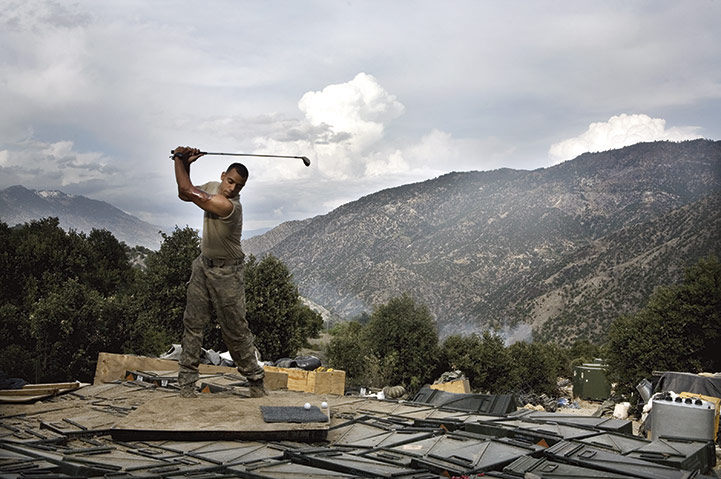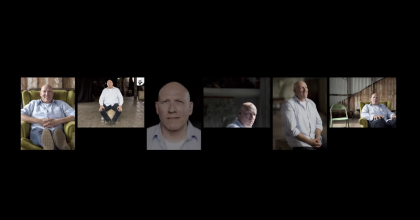
The Death of Vanity Fair’s Tim Hetherington
Photojournalist Tim Hetherington, who died at age 40 in Misrata, Libya, was a veritable factory of war portraits, more sublime photos than grisly ones, and never shirked from going rogue.
His scenes in Oscar-nominated Restrepo (2010) capture the establishment of a U.S. Army outpost in the Korengal Valley at the border of Pakistan and Northern Afghanistan. Whatever is preoccupying his lens, over the shoulder of his subject is a vast valley of vibrant green trees and Afghan homes stacked upwards on the mountain like well-carpentered staircases.
Hetherington, the poor chap who was born in the UK, had his groin blown out by a mortar shell launched by Qaddafi. Libyan forces attacked the international press corps with unfortunate precision, Hetherington, who had spent years in Liberia and Sierra Leone documenting their civil war, was severed by shrapnel. Anti-Qaddafi forces named the central square of Ajdabiya, a rebel stronghold, after Hetherington.
Tim’s job was to make himself invisible and let you forget the camera man is working. He was bloody good at it too. In Restrepo, he guides the watcher into the stark frontier of the world’s most violent war theatre. 75% of all NATO bombs are dropped here and 20% of all fighting in Afghanistan happens on its shelled surface.
(Sebastian Junger, left, and Tim Hetherington, right, in Korengal Valley outpost)
Hetherington expired shortly after his last tweet which read: ‘In besieged Libyan city of Misrata. Indiscriminate shelling by Qaddafi forces. No sign of NATO’. Sebastian Junger, the man with whom he produced his documentary in the valley, ponders the place in Libya where Hetherington died in a Vanity Fair piece:
I’ve never even heard of Misrata before, but for your whole life it was there on a map for you to find and ponder and finally go to. All of us in the profession—the war profession, for lack of a better name—know about that town. It’s there waiting for all of us. But you went to yours, and it claimed you. You went in by boat because the city was besieged by forces loyal to Muammar Qaddafi (another name you probably never gave much thought to during your life) and you must have known this was a bad one.
It concentrates the mind doesn’t it? There is a place on the map, marked and idle, waiting just for you.
I won’t bother you with the war clichés, but I can offer some on Afghanistan: woe will be on that soldier who thinks war can do good things in a land where your only friend is the mountain.
In his lesser known A Young British Soldier, Rudyard Kipling—author of the Jungle Book and Kim—wrote this:
When you’re wounded and left on Afghanistan’s plains.
And the women come out to cut up what remains,
Jest roll to your rifle and blow out your brains
And go to your Gawd like a soldier
The film’s strength is that it could be propaganda for either side’s trenches. You could make the case that it shows that the US army, the Airborne’s 2nd battalion who are the stars of the piece, are peerlessly brave and have weathered the apocalypse that has befallen every other Empire (USSR, Britain) that trudged the rolling hills of Afghanistan. A Bolshevik military strategist in 1921, in a book straightforwardly titled Afghanistan, said under no circumstance or pretext should the Red Army ever go there.
But you could easily make the counter argument that Hetherington’s lens is meant to bring us the foul side of war and the movie is certainly not in the service of NATO’s occupation. Hetherington captures masterfully the army’s envoy during a meeting with Afghan elders where he promises them a bounty of wealth if they help shake out the Taliban: ‘we can make you guys richer, make you more money. Healthcare.’ A stupid remark made by a vapid person who has no authority to grant any of things he claims to be bargaining with. Most Americans don’t even have money, healthcare or riches. Why lie? It only emboldens the enemy.
Hetherington’s early and unglamorous death is made somewhat easier to digest since he left us with a lifetime’s worth of pictures from places he’d been. Forensically and without cessation, Hetherington snaps the sheer contradiction of the Afghan war—an utterly futile mission against a blackhearted and equally futile jihad. Restrepo is, in the same moment, a response to the self-righteous anti-war crowd who think the Taliban is morally superior to the U.S. and a refutation of the war hawks that think we can do some good over there.
Harnessing epic contradictions like these was Hetherington’s great contribution to journalism. Immortalized as he is in the freshly liberated town in Libya, one can faintly detect the irony of how, with his name put on the map, ‘Tim Hetherington Square’, that the eponymous space is now waiting patiently to claim another journalist.
Tim Hetherington (1970-2011)
Photojournalist Tim Hetherington, who died at age 40 in Misrata, Libya, was a veritable factory of war portraits, more sublime photos than grisly ones, and never shirked from going rogue.
His scenes in Oscar-nominated Restrepo (2010) capture the establishment of a U.S. Army outpost in the Korengal Valley at the border of Pakistan and Northern Afghanistan. Whatever is preoccupying his lens, over the shoulder of his subject is a vast valley of vibrant green trees and Afghan homes stacked upwards on the mountain like well-carpentered staircases.
Hetherington, the poor chap who was born in the UK, had his groin blown out by a mortar shell launched by Qaddafi. Libyan forces attacked the international press corps with unfortunate precision, Hetherington, who had spent years in Liberia and Sierra Leone documenting their civil war, was severed by shrapnel. Anti-Qaddafi forces named the central square of Ajdabiya, a rebel stronghold, after Hetherington.
Tim’s job was to make himself invisible and let you forget the camera man is working. He was bloody good at it too. In Restrepo, he guides the watcher into the stark frontier of the world’s most violent war theatre. 75% of all NATO bombs are dropped here and 20% of all fighting in Afghanistan happens on its shelled surface.
(Sebastian Junger, left, and Tim Hetherington, right, in Korengal Valley outpost)
Hetherington expired shortly after his last tweet which read: ‘In besieged Libyan city of Misrata. Indiscriminate shelling by Qaddafi forces. No sign of NATO’. Sebastian Junger, the man with whom he produced his documentary in the valley, ponders the place in Libya where Hetherington died in a Vanity Fair piece:
I’ve never even heard of Misrata before, but for your whole life it was there on a map for you to find and ponder and finally go to. All of us in the profession—the war profession, for lack of a better name—know about that town. It’s there waiting for all of us. But you went to yours, and it claimed you. You went in by boat because the city was besieged by forces loyal to Muammar Qaddafi (another name you probably never gave much thought to during your life) and you must have known this was a bad one.
It concentrates the mind doesn’t it? There is a place on the map, marked and idle, waiting just for you.
I won’t bother you with the war clichés, but I can offer some on Afghanistan: woe will be on that soldier who thinks war can do good things in a land where your only friend is the mountain.
In his lesser known A Young British Soldier, Rudyard Kipling—author of the Jungle Book and Kim—wrote this:
When you’re wounded and left on Afghanistan’s plains.
And the women come out to cut up what remains,
Jest roll to your rifle and blow out your brains
And go to your Gawd like a soldier
The film’s strength is that it could be propaganda for either side’s trenches. You could make the case that it shows that the US army, the Airborne’s 2nd battalion who are the stars of the piece, are peerlessly brave and have weathered the apocalypse that has befallen every other Empire (USSR, Britain) that trudged the rolling hills of Afghanistan. A Bolshevik military strategist in 1921, in a book straightforwardly titled Afghanistan, said under no circumstance or pretext should the Red Army ever go there.
But you could easily make the counter argument that Hetherington’s lens is meant to bring us the foul side of war and the movie is certainly not in the service of NATO’s occupation. Hetherington captures masterfully the army’s envoy during a meeting with Afghan elders where he promises them a bounty of wealth if they help shake out the Taliban: ‘we can make you guys richer, make you more money. Healthcare.’ A stupid remark made by a vapid person who has no authority to grant any of things he claims to be bargaining with. Most Americans don’t even have money, healthcare or riches. Why lie? It only emboldens the enemy.
Hetherington’s early and unglamorous death is made somewhat easier to digest since he left us with a lifetime’s worth of pictures from places he’d been. Forensically and without cessation, Hetherington snaps the sheer contradiction of the Afghan war—an utterly futile mission against a blackhearted and equally futile jihad. Restrepo is, in the same moment, a response to the self-righteous anti-war crowd who think the Taliban is morally superior to the U.S. and a refutation of the war hawks that think we can do some good over there.
Harnessing epic contradictions like these was Hetherington’s great contribution to journalism. Immortalized as he is in the freshly liberated town in Libya, one can faintly detect the irony of how, with his name put on the map, 'Tim Hetherington Square', that the eponymous space is now waiting patiently to claim another journalist.
Tim Hetherington (1970-2011)












